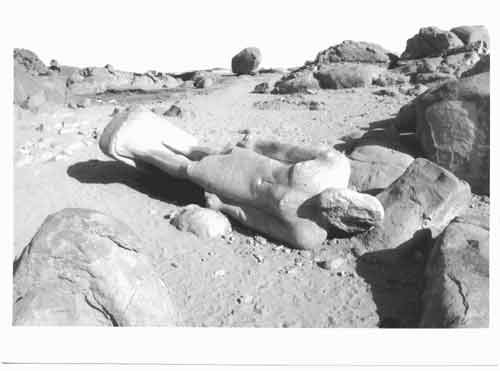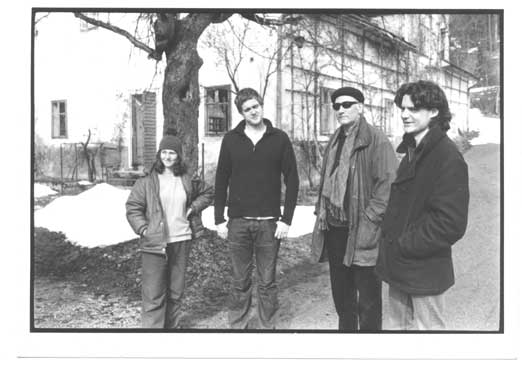Die Relativitaetstherapie
oder: 25 Vorschlaege fuer eine neue Europa-Hymne
Eine Hymne besteht bekanntlich aus zwei Teilen: Text
- und Musik.
Der musikalische Teil ist relativ einfach zu erklaeren: Es handelt sich
um die Adaption einer bereits bestehenden, international anerkannten Hymne,
THE PUSHER (STEPPENWOLF) in einer - der Computer macht’s moeglich
- Neubearbeitung durch Wolfgang Amadeus Mozart. Selbstverstaendlich werden
auch historische Referenzen gebracht, wie unter anderem die alte grossoesterreichische
Hymne von J. Haydn in ihrer letztgueltigen, auch heute noch aktuellen
Fassung (‘Gott bewahre, Gott beschuetze vor dem Kaiser unser Land’).
Auch Stockhausen darf nicht fehlen (‘Pluramon’). Ausserdem werden
hymnenfaehige Aspekte von namhaften oberoesterreichischen Kuenstlern (August
Strindberg, Anton Bruckner, Waterloo und Robinson, etc.) zur Diskussion
gestellt.
Schwieriger verhaelt es sich mit dem Text. Da gibt es ein fundamentales
Problem: eine Europahymne - natuerlich, aber in welcher Sprache? Weite
Teile des Abends werden daher in Altgriechisch und Sanskrit deklamiert
(‘trnaih vidhiyate rajju, yaya nago’pi badhyate’ !).
Neben allgemein bekannten Gemeinplaetzen, wie dem eben zitierten, die
man heute zum europaeischen Kulturerbe zaehlen kann, konzentriert sich
unser textliches Hauptaugenmerk aber vor allem auf den literarischen Nachlass
des Dichters Hubert Rabl.
Hubert Rabl (geb. 1899 in Wels, gest. 1943 in Kairo) gilt in Fachkreisen
als einer der unverstaendlichsten aller oesterreichischen Schriftsteller.
Er hatte die Angewohnheit (die man auch E.T.A Hoffmann nachsagt), nur
in absoluter Dunkelheit zu dichten. Seine Aufzeichnungen, die sich zur
Zeit in einem Privatarchiv in der Naehe von Luxor befinden, gelten als
voellig unleserlich. Nicht nur sind die verstreuten Zettel und Heftseiten
mehrfach ueberschrieben - regelrechte ‘Palimpseste’ -, es ist
oft nichteinmal auszumachen welche Schrift das eigentlich sein soll: arabisch,
hebraeisch, koptisch, griechisch, lateinisch? Ironie des Schicksals, dass
eines der wenigen zuverlaessig identifizierte Textfragement (auf altgriechisch)
heute das Portal der Bank von Athen in Thessaloniki ziert ('?pe?ta ?????,
?stat? t?? ?pt?? p??e??... frei uebersetzt: ‘dann kam Zoogon, letzte
der sieben Staedte, deren Bewohner, als die Maedchen im Tanz ihre Haare
zu einem einzigen Zopf flochten, weder den Zopf bewunderten, noch die
Maedchen, sondern die Dialektik der Sache).
Als im Februar 1982 eine internationale Kommission eingesetzt wurde, um
die Textfragmente zu katalogisieren, kam ueberraschenderweise nur ein
einziger, in lateinischer Schrift geschriebener Satz zutage: ‘Ich
glaub, ich bin hier der einzige, der kurze Hosen anhat’. Dieser Satz
hat sich wie ein Lauffeuer im ganzen Orient verbreitet und ist heute,
in variierter Form, sogar Teil der tibetanischen Verfassung. GILBERT HANDLER
hat sich auf die Spuren des Dichters begeben und
THOMAS GRILL hat ihm dabei assistiert. Letzterer hat immer wieder, an
verschiedenen Plaetzen in Aegypten, diesen Schluesselsatz zum besten gegeben
und die spontanen Reaktionen darauf liegen nun in authentischen Originalaufnahmen
vor. Auch sie sind Teil des Rahmenprogrammes rund um die Praesentation
der Vorschlaege zu einer neuen Europahymne. (c) GUENTHER RABL

The Relativity Therapy
or: 25 Suggestions for a New European Anthem
An anthem naturally consists of two parts: text and music.
The musical part is relatively simple to explain: it deals with an adaptation
of an already existing, internationally recognized anthem, The Pusher
(Steppenwolf) in a - the computer makes it possible - new re-working through
Wolfgang Amadeus Mozart. Of course, historical references will also be
brought in, as already with the old Greater Austria anthem of J.Haydn
in its last valid version which is still current today ('Gott bewahre,
Gott beschuetze vor dem Kaiser unser Land'). ('God save, God protect our
country before our emperor' ). Stockhausen also may not be missing ('Pluramon').
Besides, anthem-capable aspects from renowned Upper Austrian artists (August
Strindberg, Anton Bruckner, Waterloo und Robinson, etc.) are also up for
discussion.
It's a more difficult matter with the text. There is a fundamental problem:
a European anthem - naturally, but in what language? Large portions of
the evening will be declaimed, therefore, in Ancient Greek and Sanskrit
('trnaih vidhiyate rajju, yaya nago'pi badhyate' !).
In addition to generally known platitudes, such as the one just cited,
which can today be regarded as part of the European cultural heritage,
our main textual focus is especially concentrated on the literary estate
of the poet Hubert Rabl.
Hubert Rabl (b. 1899 in Wels, d. 1943 in Cairo) is known in expert circles
as one of the most non-understandable of all Austrian writers. He had
the habit (which is also attributed to E.T.A. Hoffmann) of writing poetry
only in absolute darkness. His notes, which are located in a private archive
near Luxor, are known to be fully unreadable. Not only are the scattered
slips of paper and notebook sheets completely written over several times
- downright 'palimpsets' - it is not even decipherable which script it
actually should be: Arabic, Hebrew, Coptic, Greek, Latin? The irony of
fate is that one of the few reliably identified text fragments (written
in Ancient Greek) adorns the portal of the Bank of Athens in Thessaloniki
('?pe?ta ?????, ?stat? t?? ?pt?? p??e??... loosely translated 'then came
Zoogon, the last of the seven cities, whose inhabitants, as the girls
twisted their hair into a single braid in dance, neither admired the braid,
nor the girls, but rather the dialectic of the matter').
As an international commission was set up in February 1982 to catalogue
the text fragment, a single sentence, written in Latin, surprisingly surfaced:
'I think I am the only one who is wearing short pants.' This sentence
spread like wildfire throughout the Orient, and is today, in a somewhat
varied form, even part of the Tibetan constitution. Gilbert Handler has
been following the tracks of the poet and Thomas Grill has been assisting
him. The latter has repeatedly recited this key sentence in different
locations in Egypt, and the spontaneous reactions to it are available
in authentic original recordings. These are also a part of the supporting
program concerning the presentation of suggestions for a new European
anthem. (c) G.Rabl

Lisa Rozman Florian Bogner Guenther Rabl Gilbert Handler